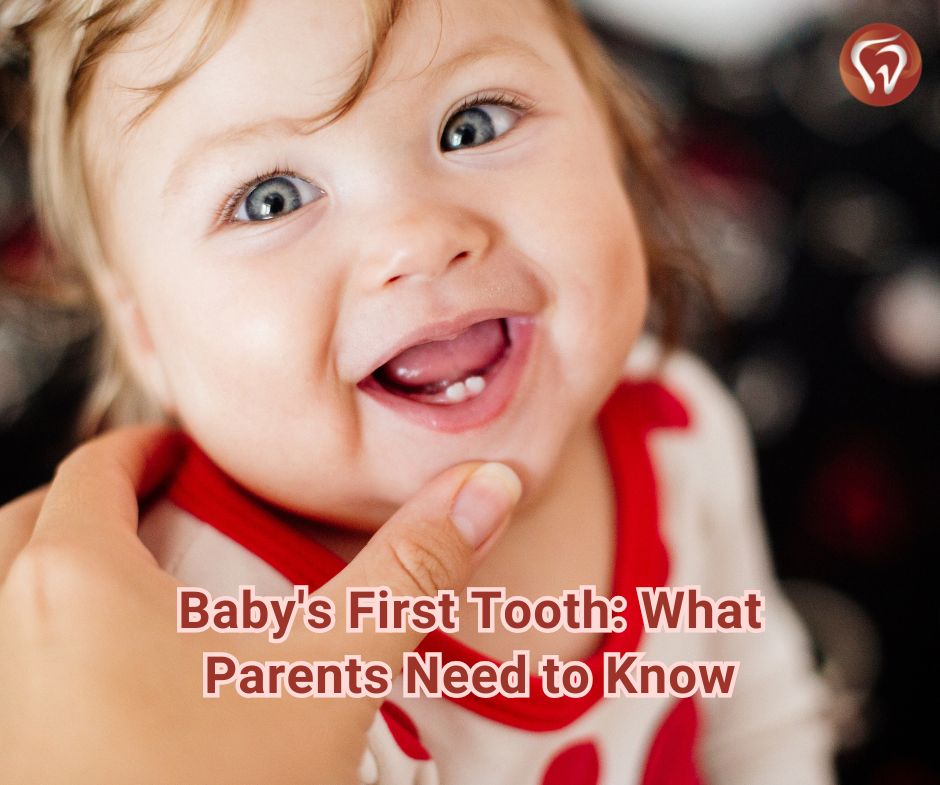Your baby’s first tooth is a big milestone! It’s an exciting time, but it can also bring up many questions. From teething symptoms to dental care, there’s a lot to think about. You can feel confident that this guide will take you through each step of the process.
Taking care of your baby’s first tooth is more than just about keeping it clean—it’s about laying the foundation for good oral health habits that will benefit them for years to come. Let’s get into what you need to know, along with practical tips you can use today.
The Teething Phase
When Do Babies Start Teething?
Teething in babies usually begins between 4 and 7 months of age. However, some may begin earlier, while others might show their first tooth closer to their first birthday. Every baby develops at their own pace, so don’t worry if your little one doesn’t follow the exact timeline.
Signs of Teething to Watch For
Your baby may be teething if you notice any of the following signs:
- Increased drooling.
- Fussiness or irritability.
- Swollen or tender gums.
- Changes in eating or sleeping patterns.
- A habit of chewing on toys, fingers, or anything within reach.
If your baby is unusually fussy or develops a fever, visit us to rule out other potential issues.
How to Soothe Teething Discomfort
Teething can be uncomfortable, but there are several ways to help your baby feel better:
- Offer a chilled (not frozen) teething toy for your baby to chew on.
- Gently massage their gums with a clean finger.
- Let them chew on a cold, damp washcloth.
- Speak with Dr. Jacob before using over-the-counter teething gels or medications.
Caring for Your Baby’s First Tooth
Why Early Oral Care Matters
Baby teeth are small but mighty! They support your child in eating, talking, and smiling with ease. Healthy baby teeth also act as placeholders for permanent teeth, ensuring proper alignment as your child grows. Neglecting oral care, even in infancy, can lead to cavities or gum issues.
How to Clean Your Baby’s First Tooth
Start cleaning your baby’s tooth as soon as it appears. Here’s how:
- Gently wipe your baby’s tooth and gums with a soft, damp cloth after each feeding.
- As more teeth begin to appear, transition to using a baby toothbrush with soft bristles.
- Apply a small amount of fluoride toothpaste, roughly the size of a grain of rice (safe for infants), and brush your baby’s teeth twice a day.
Making oral care part of your daily routine now will make it easier for your baby to adapt as they grow.
Baby’s First Dental Visit
When Should the First Visit Happen?
The Canadian Dental Association suggests booking your baby’s first dental visit by their first birthday or within six months of their first tooth emerging. These early visits give the dentist a chance to monitor your child’s dental growth and identify any issues before they turn into bigger concerns.
What Happens During the First Visit?
The first dental visit is typically brief and focuses on introducing your baby to the dental office in a positive way. Here’s what you can expect:
- Dr. Jacob will inspect your baby’s teeth, gums, and jaw to identify any possible concerns.
- You’ll receive tips on feeding, teething, and maintaining oral hygiene.
- The dentist may discuss habits like thumb-sucking or pacifier use.
At Signature Smilez Family Dental, we take extra care to make this first visit as comfortable and stress-free as possible. Our team is here to support you and help set your child up for a lifetime of healthy, confident smiles.
Tips for Preparing Your Baby
- Schedule the visit at a time when your baby is usually calm, such as after a nap.
- Consider bringing along a beloved toy or comfort item to help your baby feel more relaxed.
- Stay calm and positive—your attitude can influence how your baby reacts.
Common Questions Parents Have About Baby Teeth
1. What if my baby’s teeth come in late?
Don’t panic if your baby doesn’t start teething at the same time as others. Some babies don’t get their first tooth until they are 12 months or older. If you’re concerned, bring it up during a check-up with your dentist.
2. Should I avoid giving my baby sugary foods or drinks?
Yes. Sugary foods and drinks can lead to cavities, even in baby teeth. If your baby drinks formula, breastmilk, or juice, avoid letting them fall asleep with a bottle, as this can increase the risk of tooth decay.
3. Are pacifiers or thumb-sucking bad for my baby’s teeth?
Pacifiers and thumb-sucking are common soothing habits for babies. However, prolonged use after age 2–4 can lead to misalignment of teeth or jaw issues. Talk to Dr. Jacob for tips on gently weaning your child off these habits.
4. How can I tell if my baby has a cavity?
Signs of cavities in baby teeth may include the appearance of brown or white spots, increased sensitivity, or visible holes. Regular dental check-ups can spot cavities early, helping to avoid more serious problems later on.
Conclusion
Your baby’s first tooth is a stepping stone to a healthy smile, and as a parent, you play the most important role in building that foundation. From soothing teething discomfort to establishing good oral hygiene habits, these early steps can make a lifetime of difference.
Remember, the journey to healthy teeth starts now. If you have any questions or concerns about your baby’s teeth, visit us at Signature Smilez Family Dental. Our friendly team is here to guide you and your little one every step of the way.
Let’s make your baby’s dental milestones something to smile about!

